新概念英语第二册Lesson 2 _Breakfast_or_lunch
新概念英语第二册第二课课文及课后练习题

Lesson 2 Breakfast or lunch?It was Sunday. I never get up early on Sundays. I sometimes stay in bed until lunch time. Last Sunday I got up very late. I looked out of the window. It was dark outside. 'What a day!' I thought. 'It's raining again.' Just then, the telephone rang. It was my aunt Lucy. 'I've just arrived by train,' she said. 'I'm coming to see you.''But I'm still having breakfast,' I said.'What are you doing?' she asked.'I'm having breakfast,' I repeated.'Dear me,' she said. 'Do you always get up so late? It's one o'clock!'New words and expressions 生词和短语until prep. 直到outside adv. 外面ring v. (铃、电话等)响aunt n. 姑,姨,婶,舅母repeat v. 重复参考译文第二课早餐还是午餐?那是个星期天,而在星期天我是从来不早起的,有时我要一直躺到吃午饭的时候。
上个星期天,我起得很晚。
我望望窗外,外面一片昏暗。
新概念英语2LESSON2Breakfast or lunch

3.Why was the writer's aunt surprised?
【Key structures】生词和短语
感叹句(Exclamations)
以 what 开头的感叹句结构为:What+adj.+n.+(主语+谓语)! Eg:What an interesting play(it is)!多么有趣的一出戏! =How interesting the play is. How + adj+ 主语+谓语
Lesson 2 Breakfast or lunch? 第二课 早餐还是午餐?
Questions:
1.Do you get up early every day? 2.What time do you usually get up every day? 3.Do you find it easy or difficult to get up? 4. What do you usually have for breakfast?
2. What a wonderful garden(this is)! = ____________________________.
【Key structures】生词和短语
频率副词 • always 总是 • almost always;near always 几乎总是 • generally;normally; regularly;usually 一般说来,通常来说 • frequently;often 经常
4 v.(铃、电话等)响 (刺耳的) The telephone is ringing.
新概念英语第二册第二课课文及课后练习题
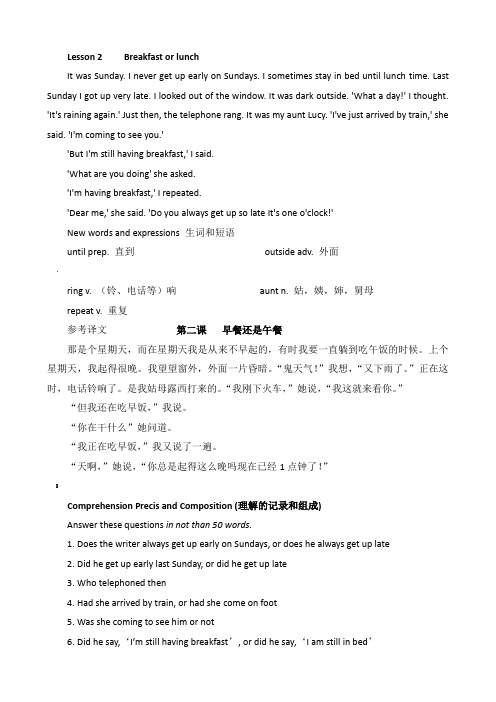
Lesson 2 Breakfast or lunchIt was Sunday. I never get up early on Sundays. I sometimes stay in bed until lunch time. Last Sunday I got up very late. I looked out of the window. It was dark outside. 'What a day!' I thought. 'It's raining again.' Just then, the telephone rang. It was my aunt Lucy. 'I've just arrived by train,' she said. 'I'm coming to see you.''But I'm still having breakfast,' I said.'What are you doing' she asked.'I'm having breakfast,' I repeated.'Dear me,' she said. 'Do you always get up so late It's one o'clock!'New words and expressions 生词和短语until prep. 直到outside adv. 外面·ring v. (铃、电话等)响aunt n. 姑,姨,婶,舅母repeat v. 重复参考译文第二课早餐还是午餐那是个星期天,而在星期天我是从来不早起的,有时我要一直躺到吃午饭的时候。
上个星期天,我起得很晚。
我望望窗外,外面一片昏暗。
新概念英语教案-第二册第二课-完美版

Lesson 2 - Breakfast or lunch?TextIt was Sunday.I never get up early on Sundays.I sometimes stay in bed until st Sunday,I got up very late.I looked out of the window.It was dark outside."What a day!"I thought.It's raining again.Just then,the telephone rang.It was my aunt Lucy."I've just arrived by train."she said."I'm coming to see you.""But I'm still having breakfast."I said."What are you doing?"She asked."I'm having breakfast."I repeated."Dear me!"She said."Do you always get up so late?It's one o'clock."New words and expressions 生词和短语until prep. 直到outside adv. 外面ring v. 〔铃、等〕响aunt n. 姑,姨,婶,舅母repeat v. 重复Note on the text 课文注释1 on Sundays, 指每个星期日。
星期几的前面用介词on。
2 What a day! 多么糟糕的天气!这是一个省略的感慨句。
完整的句子应该是Whata day it is!英语中的感慨句常用what开头,后面紧跟一个名词或名词性短语〔包括连系动词〕,然后是主语和谓语,句尾用感慨号。
(完整版)新概念英语第二册第二课(包含课文、练习和答案)
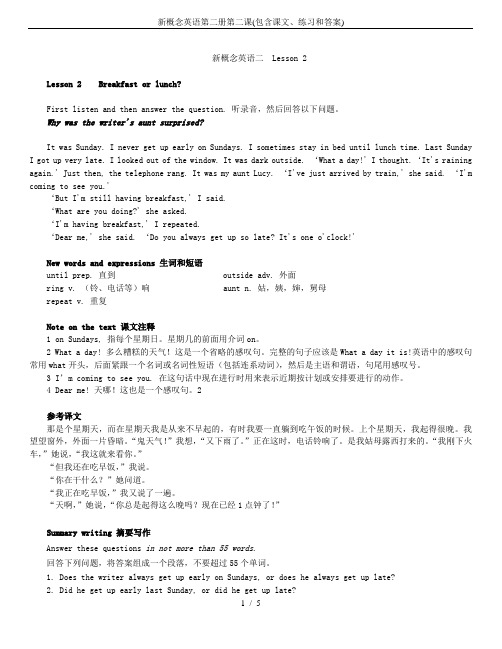
新概念英语二 Lesson 2Lesson 2 Breakfast or lunch?First listen and then answer the question. 听录音,然后回答以下问题。
Why was the writer's aunt surprised?It was Sunday. I never get up early on Sundays. I sometimes stay in bed until lunch time. Last Sunday I got up very late. I looked out of the window. It was dark outside. ‘What a day!' I thought.‘It's raining again.' Just then, the telephone rang. It was my aunt Lucy. ‘I've just arrived by train,' she said. ‘I'm coming to see you.'‘But I'm still having breakfast,' I said.‘What are you doing?' she asked.‘I'm having breakfast,' I repeated.‘Dear me,' she said. ‘Do you always get up so late? It's one o'clock!'New words and expressions 生词和短语until prep. 直到 outside adv. 外面ring v. (铃、电话等)响 aunt n. 姑,姨,婶,舅母repeat v. 重复Note on the text 课文注释1 on Sundays, 指每个星期日。
新概念英语第二册Lesson2说课讲解
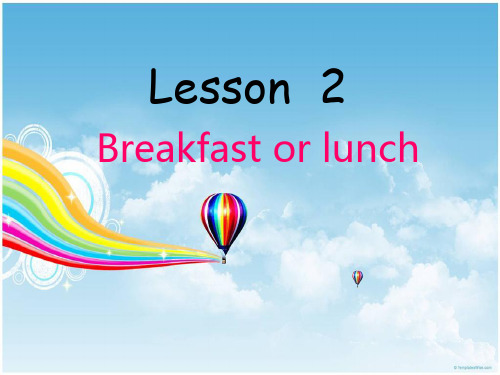
【New words 】
1 until prep. 直到 2 outside adv. 外面 3 ring v. (铃、电话等)响 4 aunt n. 姑,姨,婶,舅母 5 repeat v. 重复
★until prep. 直到
until 用 于表示动
Reading
Predict:
1.What do you think this passage will talk about after reading the title?
2.What is the main idea of the passage?
I always get up late on Sundays. And my aunt was surprised that I was still having breakfast in the afternoon last Sunday.
to wait just outside the door
3. ring (rang, rung)
动词 ①鸣,响(铃,电话等) eg. Every moring the clock ring at 6.
The telephone is ringing. ①打电话给
ring sb. eg. Tomorrow I'll ring you.
直到中午雨才停止。
I did not learn it until yesterday . 到昨天我才知道。
He did not show himself in his true colors until he gained power. 直到他掌权之后,他才露出自己的真 面目。
新概念2--lesson-2-Breakfast-or-lunch讲解

I stay in bed until twelve o'clock. (translate) I didn't get up until 12 o'clock.
2. outside (1) n. the outside of the house (2) adj. 外面的,外来的 an outside toilet 户外厕所 outside help外来的帮助 (3) adv. 在外面 It was dark outside. Please wait outside. (4) prep. It’s outside my business. 这不关我的事。 (5) 反义词: inside n./adj./adv./prep. (6) outsider: n 局外人
Filling: Five-nuts Red bean paste Lotus seed paste Salted duck egg yolk
Review
Go to the theatre Take a seat//be seated Interesting/interested/boring Behind//in front of Loudly/quietly Be angry with//angrily Rudely//politely Hear Turn round//turn around Pay attention to// pay no attention In the end None of your business//mind your own business Private conversation
got up very late. I looked out of the window. It was dark outside. “What a day!” I thought. “It’s raining again.” Just then, the telephone rang. It was my aunt Lucy. “I’ve just arrived by train,” she said. “I’m coming to see you.”
新概念英语第二册 lesson 2

一般现在时的用法
• 表示习惯性动作, 真理! 是过去、现在和未来都会发生的事 情。一般现在时一般与频率副词 often,always, sometimes,never,frequently,rarely,ever 等连用。 • 1)表示经常、反复发生的动作,现存的习惯或状态。 • We are Chinese. • 2)表示客观事实或普遍真理。 • The earth goes round the sun. • 3)表示安排或计划好的未来的动作,只限于go, come, leave, start, stay, return, arrive, begin, be 等动词。 • My train leaves at 6:30 this morning. • 4)表示主语的特征、性格、能力等。 • She is always ready to help others.
一般现在时第三人称单数变化规则
• 1.)一般情况下,直接加 -s • eg. works, plays, rains, sees • 2.)以 sh, ch, s, x 或 o 结尾的词后加 –es • eg. washes, teaches, fixes, does, goes • 3).以辅音字母加 -y 结尾的,先把 ‘y’ 改成‘i’,再加 -es • eg. studies, flies, carries
New Concept English Book2
Lesson 2 Breakfast or Lunch?
【New words and expressions】
until prep.直到
outside adv. 外面(作状语) ring(rang. rung) v.(铃、电话等)响
aunt
新概念英语第二册第2课-Breakfast or lunch-

新概念英语第二册第2课:Breakfast or lunch? Lesson 2 Breakfast or lunch早餐还是午餐First listen and then answer the question.听录音,然后答复以下问题。
Why was the writer s aunt surprisedIt was Sunday. I never get up early on Sundays. I sometimes stay in bed until lunchtime.那是个星期天,而在星期天我是从来不早起的,有时我要一直躺到吃午饭的时候。
Last Sunday I got up very late. I looked out of the window. It was dark outside.上个星期天,我起得很晚。
我望望窗外,外面一片昏暗。
What a day! I thought. It s raining again. Just then, the telephone rang. It was my aunt Lucy.“鬼天气!〞我想,“又下雨了。
〞正在这时,电话铃响了。
是我姑母露西打来的。
I ve just arrived by train, she said. I m coming to see you.“我刚下火车,〞她说,“我这就来看你。
〞But I m still having breakfast, I said.“但我还在吃早饭,〞我说。
What are you doing she asked.“你在干什么?〞她问道。
I m having breakfast, I repeated.“我正在吃早饭,〞我又说了一遍。
Dear me, she said. Do you always get up so late It s one o clock! “天啊,〞她说,“你总是起得这么晚吗?现在已经1点钟了!〞New words and expressions 生词和短语untilprep. 直到outsideadv. 外面ringv. 〔铃、电话等〕响auntn. 姑,姨,婶,舅母repeatv. 重复Notes on the text 课文注释1 on Sundays,指每个星期日。
新概念英语教案_第二册第二课_

Lesson 2 - Breakfast or lunch?三、精讲课文1、It was Sunday. 这里的it是虚主语,可以指代时间、天气、温度、距离等多种事物,也可以指代某个不确定的人。
接下来课文中还会出现很多个it,让我们来一起看看它到底指代什么。
2、I never get up on Sundays. 这是在说我一直以来的习惯,所以用了一般现在时。
never从来不、绝对不。
频率副词,可以用在多种时态中。
例句:-Have you loved me? -Never. -Will you marry me? -Never. 太绝情了!on Sundays 在每一个星期天。
on用在具体的某一天之前,例如on March 21st,on Monday,on Monday morning在这里Sundays用了复数,表示在每一个星期天。
3、I sometimes stay in bed until lunchtime. 这句话也是一般现在时,表示习惯。
sometimes 有时。
频率副词。
常用于一般现在时。
例句:I usually get up at seven but sometimes at eight.stay in bed 待在床上不起来。
这恐怕是每个人的梦想吧,“赖床”。
stay是个持续性动词。
in bed 在床上睡觉VS 仅仅是陷在床里面in the beduntil和till的区别:till只用在肯定句中,until可以用在肯定句或否定句中。
until 用在肯定句中,表示一个动作一直持续到某时。
He stayed in bed until/till lunchtime.用在否定句中,表示直到什么时间才做了某事。
He didn’t get up until lunchtime.例句:Last night I stayed up until/till 12:00. = Last night I didn’t go to bed until 12:00.搞笑:梁朝伟在《韩城攻略》里的台词:TTTTT=Till They Tell The Truth。
新概念英语第二册第2课 完整

from time to time 有时候 • almost never;hardly ever;rarely;
scarcely ever;seldom 很少 • not…ever;never 从不
not until...
She didn't go to bed until eleven o'clock. 她直到十一点才上床睡觉。
They didn't find her until the next day. 他们直到第二天才找到她。
• outside /'aut'saɪd/ n. 外面,外部,外观 备注:inside 里边 outsider 局外人
• aunt /a:nt/ n. 姑母,姨母,阿姨,伯母,舅母,舅妈 uncle 叔叔,伯伯,伯父
• repeat /ri'pi:t/ n. 重复 v.重复
He repeated several times that he was busy. Today's lecture was an exact repeat of yesterday's.
Listen to the story and keep these questions in mind.
• What was the weather like last Sunday? • Who was coming to see the writer? • Why was the writer's aunt surprised?
新概念英语第二册 第2课Breakfast or lunch
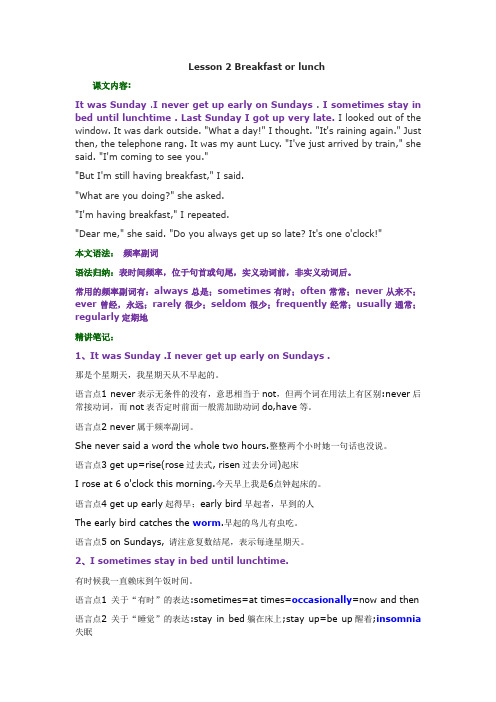
Lesson 2 Breakfast or lunch课文内容:It was Sunday.I never get up early on Sundays. I sometimes stay in bed until lunchtime. Last Sunday I got up very late.I looked out of the window. It was dark outside. "What a day!" I thought. "It's raining again." Just then, the telephone rang. It was my aunt Lucy. "I've just arrived by train," she said. "I'm coming to see you.""But I'm still having breakfast," I said."What are you doing?" she asked."I'm having breakfast," I repeated."Dear me," she said. "Do you always get up so late? It's one o'clock!"本文语法:频率副词语法归纳:表时间频率,位于句首或句尾,实义动词前,非实义动词后。
常用的频率副词有:always总是;sometimes有时;often常常;never从来不;ever曾经,永远;rarely很少;seldom很少;frequently经常;usually通常;regularly定期地精讲笔记:1、It was Sunday .I never get up early on Sundays .那是个星期天,我星期天从不早起的。
新概念英语第二册Lesson2(共62张PPT)

Who? Which? What?
How?
Where?
When?
1. a tree in the corner of the garden he planted 2. we at home stay on Sundays 3. the match at four o'clock ended 4. before lunch the letter in his office quickly he read
一个简单陈述句可以由六部分组成,但是并不是所有 句子都有这么多组成部分,而是包含其中的某几个。 这六部分的排列顺序是基本固定的。
When
Who? Which? What?
Action
Who? Which? What?
How?
Where?
When?
练习题
When? Who? Action Which? What?
直宾
宾语:句子中动 词的接受者;
S + V(vt) + IO + DO 5 基本句型五:主+ 谓+ 宾+ 补
S + V(vt) + DO + OC
During the trip
an angry zookeeper
基本句型五
补充说明宾语,与 之有逻辑关系
We call the man ‘zookeeper’.
Lesson 2 Breakfast or lunch?
Lesson 1 A private conversation
• 上星期我去看戏. 我的座位很好, 戏很有意思, 但我却无法欣赏. 一青年男子与一青年女子坐 在我的身后, 大声地说着话. 我非常生气, 因 为我听不见演员在说什么. 我回过头去怒视着 那一男一女, 他们却毫不理会. 最后, 我忍不 住了, 又一次回过头去, 生气地说 : “我一个 字也听不见了!”
【新概念英语第二册26课课文】新概念英语第二册第2课:Breakfast or lunch
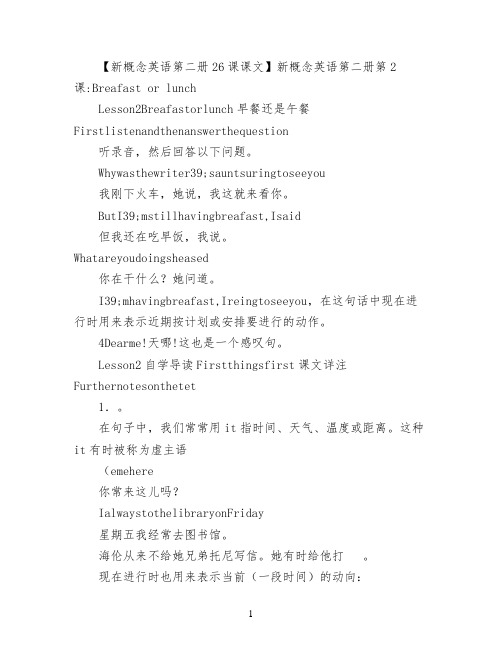
【新概念英语第二册26课课文】新概念英语第二册第2课:Breafast or lunchLesson2Breafastorlunch早餐还是午餐Firstlistenandthenanswerthequestion听录音,然后回答以下问题。
Whywasthewriter39;sauntsuringtoseeyou我刚下火车,她说,我这就来看你。
ButI39;mstillhavingbreafast,Isaid但我还在吃早饭,我说。
Whatareyoudoingsheased你在干什么?她问道。
I39;mhavingbreafast,Ireingtoseeyou,在这句话中现在进行时用来表示近期按计划或安排要进行的动作。
4Dearme!天哪!这也是一个感叹句。
Lesson2自学导读Firstthingsfirst课文详注Furthernotesonthetet1.。
在句子中,我们常常用it指时间、天气、温度或距离。
这种it有时被称为虚主语(emehere你常来这儿吗?IalwaystothelibraryonFriday星期五我经常去图书馆。
海伦从来不给她兄弟托尼写信。
她有时给他打。
现在进行时也用来表示当前(一段时间)的动向:Jacisworinghardthesedays杰克最近工作很努力。
Hedoesnotusuallyworhard他通常是不努力工作的。
2.感叹句Eclamations以what开头的感叹句结构为:What+adj+n主语谓语!主语和谓语经常被省略:Whataninterestingorningtheclocringsat6这钟每天早上6点响。
(2)打给(美国英语中用call):ewhenyougethome到家后请来个。
Didyouringthedoctor你给医生打了吗?2.ree请跟我重复。
Don39;trepeat不要重复。
Lesson2课后练习和答案EercisesandAnswer。
(完整版)新概念第二册lesson2

Lesson 2 Breakfast or lunch?【New words and expressions】★until prep.直到until用于表示动作、状态等的持续,可译为“一直到……为止”或“在……以前”。
在肯定句中,它与表示持续性状态的动词连用,表示持续到某一时刻:I’ll wait here until 5. 我会在这里等到5点钟。
在否定句中,它通常与描述短暂动作的动词连用,表示“到……为止”、“直到……才”:She cannot arrive until 6. 她到6点才能来。
His father didn't die until he came back.until(后的从句)的时间终止之前,这个动作做了还是没做?做了前面的主句用肯定;没做用否定For he ___A(C)___(wait) until it stopped raining.A. waitedB. didn't waitA. leaveB. leftC. didn't leave★outside adv. 外面(作状语)He is waiting for me outside.★ring(rang. rung) v.(铃、电话等)响① vt. 鸣,(铃、电话等)响(这种响是刺耳的, 往往是提醒人做某事)Every morning the clock rings at 6.The telephone(door bell) is ringing.而风铃等响要用jingle,jingle (bell) (铃儿) 响叮当② vt. 打电话给(美语中用call)ring sb. 给某人打电话③ n. (打)电话give sb. a ringRemember to give me a ring. /Remember to ring me.④ n. 戒指★aunt n. 姑,姨,婶,舅妈(所有长一辈的女性都用这个称呼)男性则是uncle: 叔叔他们的孩子:cousin 堂兄妹(不分男女)cousin的孩子:nephew 外甥;niece 外甥女★repeat v. 重复① vt. 重复Will you repeat the last word?② vi. 重做,重说Please repeat after me.【课文讲解】1、It was Sunday.it指时间、天气、温度或距离,it被称为“虚主语”(empty subject)。
新概念英语第二册--第2课

get up early
got up very late
dark outside
look out of the window
raining
7 'What a day!' I thought.
8 'It's raininFra bibliotek again.‘
9 Just then, the telephone rang. just then 就在那时 = just at that time/moment
10 It was my aunt Lucy.'
11 I've just arrived by train,' she said.
What an interesting play it is !
What a nice bag it is!
结构
How adj/adv +主谓! What a/an +adj +可n单+主谓!
What adj +可n复+主谓! What +adj+不可n!
1 It was Sunday. 2 I never get up early on Sundays.
He is waiting for me outside.
他正在外面等我。
3. ring---rang---rung v.(铃、电话等)响 v. ⑴ The telephone is ringing.电话响了。
⑵ ring sb. (up) = call sb. (up ) 给某人打电话
新概念英语2 Lesson 2 Breakfast or lunch课件讲解

The room ________ with laughter(笑声) of happy children.
A. listened B. rang C. heard D. repeated
I am afraid the same tragedy(悲剧) of yours will ______ itself.
‘But I'm still havijnugsbtretahkefans:t,就’ I s在aid那. 时 如果不知道对方性别, 他/她
Lesson 2 Breakfast or lunch?
词汇
until
I sometimes stay in bed until lunchtime prep. 直到 until前的状态一直持续到until 后的时间!
Tom玩电脑游戏一直玩到他妈妈回来。 Tome played computer games until his mother comeback. 直到听到闹钟(alarm clock)的铃声我才醒过来(wake up )。 I didn’t wake up until I heard the alarm clock. 直到他妈妈回来,他才开始做作业。 He didn’t do homework until his mother came back
在表达卧床时bed前不需加冠词: ‘But I'mIts’stiltl ihmaveinfgobrrebaekfdasnt,o’ Iwsa. id. ‘What aYroe uyomu duosintgs?’tsahye/arsekmed.ain in bed for
新概念英语第二册Lesson 2

文化背景
早餐吃什么 V.S. 午餐怎么吃
歪果仁 早餐吃什么
New words and expressions
• until [ʌn'til]
If something happens until a particular time, it happens during the period before that time and stops at that time. 直到...才;直到...为止
it 的用法 1)人称代词 一般代指无生命的东西或有生命的动物,在不分性别或情况不详时指代 This is my watch. It's a Swiss one. The baby smiled when it saw its mother. 2)用作无人称动词的主语时,表示“时间、天气、距离” It's quite early yet. It's getting dark outside. It's not far from here. It's so cold now.
New words and expressions
• aunt [ɑːnt] [ænt]
the sister of your father or mother; the wife of your uncle
姨母; 舅母; 姑母; 伯母; 婶母
uncle ['ʌŋkl]
the brother of your father or mother; the husband of your aunt 叔叔;伯父;伯伯;舅父;姨丈;姑父
Notes on the text
(完整版)新概念英语第二册第课课文及课后练习题

新概念英语第二册第课课文及课后练习题Lesson 2Breakfast or lunch?Itwas Sunday.I never getup early on Sundays.I sometimes stay inbed untillunch time. Last Sunday I got up very late. I looked out of the window. It was darkoutside. 'What a day!' I thought. 'It's raining again.' Just then, the telephone rang. Itwas my aunt Lucy. 'I've just arrived by train,' she said. 'I'm coming to see you.''But I'm still having breakfast,' I said.'What are you doing?' she asked.'I'm having breakfast,' I repeated.'Dear me,' she said. 'Do you always get up so late? It's one o'clock!'New words and expressions生词和短语until prep.直到outside adv.外面ring v.(铃、电话等)响aunt n.姑,姨,婶,舅母repeat v.重复参考译文第二课早餐还是午餐?那是个星期天,而在星期天我是从来不早起的,有时我要一直躺到吃午饭的时候。
上个星期天,我起得很晚。
我望望窗外,外面一片昏暗。
- 1、下载文档前请自行甄别文档内容的完整性,平台不提供额外的编辑、内容补充、找答案等附加服务。
- 2、"仅部分预览"的文档,不可在线预览部分如存在完整性等问题,可反馈申请退款(可完整预览的文档不适用该条件!)。
- 3、如文档侵犯您的权益,请联系客服反馈,我们会尽快为您处理(人工客服工作时间:9:00-18:30)。
(1)What a day! What引导感叹句: 引导感叹句: 引导感叹句 1. what + a/an + adj. + n.(单数 + (主谓 单数) 主谓 主谓) 单数 eg: what a beautiful picture (it is)! ! 2. what + adj. + n.(复数 + (主谓 复数) 主谓 主谓) 复数 eg: what beautiful girls! (2) How interesting it is! How 引导的感叹句: 引导的感叹句: How + adj./adv. + (主谓 主谓) 主谓 How beautiful the picture is. P 18 exercise
aunt & uncle grandmother & grandfather mother-in-law & father-in-law grandson & granddaughter cousin 堂(表)兄弟姐妹 nephew侄子,外甥 & niece 侄女,外甥女
频率副词
• I never get up early on Sundays. “never” 频度副词 频度副词(0%) • 100% all the time 一直 • 90% almost, always 几乎,总是 几乎, • 60-70% often, frequently ['frikwəntlɪ]经常 ɪ • 20-30% sometimes, at times 有时 , • 5% rarely [‘rɛrlɪ] , hardly, seldom 很少,几乎不 [‘rɛrlɪ 很少, • 位于 、助动词后面,实意v.之前 位于be、助动词后面,实意 之前 • P18 exercise
Lesson 2 Breakfast or lunch
早餐还是午餐
New words and expressions
• Until not…until 直到下课他才醒来。 直到下课他才醒来。 He didn’t wake up until the class was over.
How to address our relatives
1. • • • • • • • • • • •
Ask and answer the questions in pairs What day was it? Do you always get up late on Sundays? Do you ever get up before lunchtime? Did you think it was a nice day? Who was on the phone? How had she arrived? What did she say? What did you say? Was she surprised to hear this? Did you have to repeat yourself? What did she ask you?
Questions on the text
1. What was the weather like Last Sunday? It … 2. Who was coming to see the writer? 3. Why was the writer’s aunt surprised? Because…
Summary writinSundays. He got up late last Sunday. Then his aunt Lucy telephoned. She had arrived by train. She was coming to see him. ‘I’m still having breakfast,’he said. His aunt was very surprised. It was one o’clock. (45 words)
